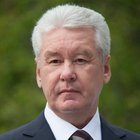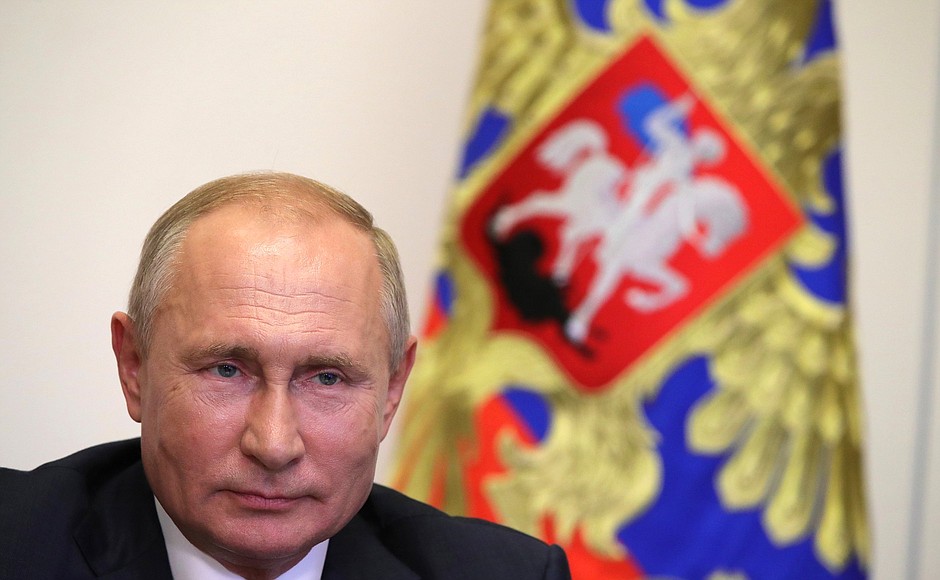
Sergei Sobyanin separately informed the President on the plans to develop transport infrastructure and Moscow’s involvement in the post-registration work on the COVID-19 vaccine.
* * *
President of Russia Vladimir Putin: Mr Sobyanin, good afternoon.
Moscow Mayor Sergei Sobyanin: Good afternoon, Mr President.
Vladimir Putin: Mr Sobyanin, we have many times discussed the situation in the capital, but first I would like to stress once again that, considering the current state and development trends in the economy, social sphere and city finance management, the socioeconomic situation in Moscow is quite favourable; that must be said. I would like to note this and thank you and your team for the results of your work.
At the same time when we meet we always talk about problems, too. It is not possible to avoid problems in such a large metropolis, with over 10 million people plus 3 million who come to Moscow every day. The population grows every year. So there are problems; we always discuss them and, of course, we will discuss them this time, too.
However, we will have to begin with a topic that everyone is tired of hearing about, but we must discuss it today. I mean the coronavirus infection and the efforts to combat it. Moscow was the first city to face these serious problems, and it is clear why: the capital has a large, the largest concentration of people; it is the largest transport hub; all the main roads pass through Moscow; all the roads cross here and all the roads begin here. It is clear that there are a lot of contacts between people, and the industry and services are very well developed.
It is clear that it would have been difficult to prevent an outbreak in this situation. Nevertheless, the city authorities took proactive – I would say, highly proactive – and effective measures to counter this disease and managed to stabilise the situation and even begin to bring the number of cases down. You were the first to impose restrictions and the first to begin lifting them, in fact, at the same time helping other Russian regions.
What are the most recent developments and your plans?
Sergei Sobyanin: Mr President, first of all, I would like to say thank you for constantly monitoring and paying attention to the difficult situation in Moscow, because a great number of problems have really been concentrated here.
Today, the coronavirus, the spread of it and response largely determine the social, political, psychological and economic developments in the city, whether we want it or not. All the decisions that we took were coordinated with the Government of the Russian Federation and with you. Indeed, they were initially quite tough but tough in moderation, only to bring down the wave of the epidemic, on the one hand; on the other hand, to enable the city to function normally. And as soon as the opportunity arose to get out of this state, we began to reopen one industry after another.
Of course, we were all worried and concerned: could we cope with the situation? Weren't we in a hurry to do it? Several months have passed. We can see that the decisions were made in a timely manner and were correct. All this time we have observed either a decrease or stabilisation of the situation.
You recall, at the peak of the disease, you helped to transfer the federal bed fund to the fight against COVID-19. During this period of time, we prepared the necessary number of beds in hospitals, which was required for the healthcare system to function normally. Today we have about 6,000 beds in such hospitals, and they are not being used. We have a large safety margin. The number of pneumonia and the number of seriously ill patients who are on ventilators is also going down. The situation has been stable over the past months, and this gives us the opportunity to take the next steps.
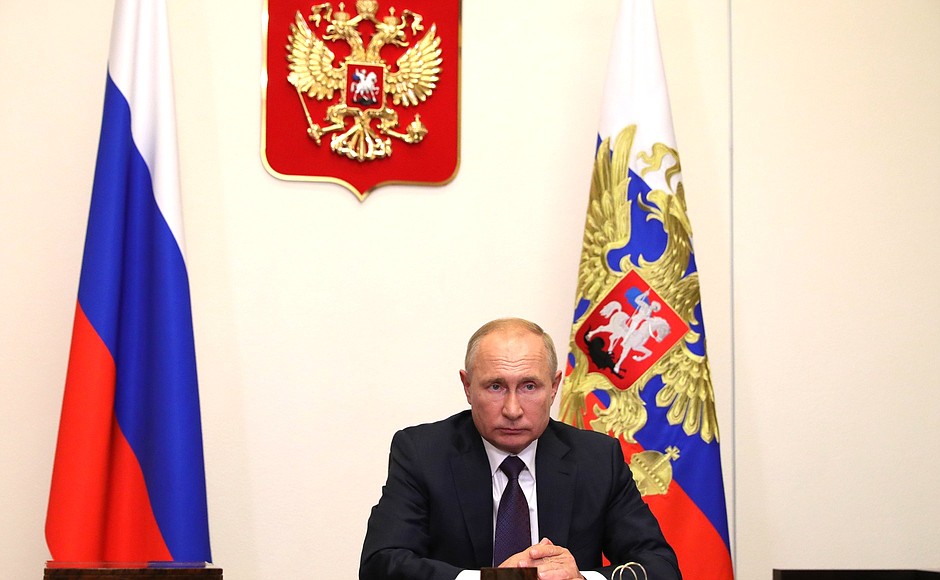
Following your instruction, the education system, schools and primary schools in the whole country and Moscow have begun to function normally. This is certainly a new challenge, new problems, but nevertheless, today the situation, in general, helps and promotes such solutions.
But, Mr President, I must say that you were absolutely right when you set us a fairly serious job of controlling the situation. We should not relax, so the number of tests we are conducting is not decreasing but increasing, and we are trying to strictly follow the requirements set by the sanitary doctors in transport, in trade, in the social system, and so on. This is very important for the situation to remain stable.
Vladimir Putin: Mr Sobyanin, the third stage of working on the vaccine against the virus, the post-registration stage, is beginning. I know that Moscow is extensively involved in this project. Tell me how it is progressing.
Sergei Sobyanin: Yes, Mr President, thank you. We received instructions from you and the Healthcare Ministry to take charge of the major part of the post-registration trials. A large-scale trial, one of the biggest in the world, involving 40,000 participants, will be conducted alongside the launch of the vaccine for immunisation of the public. We have opened free access to the trials for volunteers. More than 5,000 people signed up in just a few days so I have no doubt that we will get the necessary number of people wishing to participate in this additional study.
The entire infrastructure is ready; the information system overseeing the trials is ready, along with the storage facilities for the vaccine concentration and the distribution infrastructure. We are waiting for the final decisions from the Gamaleya Institute and the arrival of the vaccine. I think the trials will begin next week. You are absolutely right, they are very important and we will do our best to ensure that the trials in Moscow are completed successfully.
Vladimir Putin: Did you get vaccinated yourself?
Sergei Sobyanin: It would otherwise be difficult for me to promote the Russian vaccine because even today, according to polls, only half of or perhaps less than a half of Russians have doubts about whether they should get vaccinated and whether the vaccine is ready for use or not. Two months ago, when we were actively promoting this vaccine, almost 90 percent of people were sceptical about it.
In order to set the tone for my colleagues and to be sure myself that we actually have a window of opportunity in this situation and Russia actually has made its own proper vaccine, I made this decision – and our colleagues from the Gamaleya Institute allowed me to do it – and I have already been through almost half of the entire major stage. I feel normal and, hopefully, it will remain this way. But most importantly, I feel confident that we are on the right path. It is very important for everybody involved in this programme.
Vladimir Putin: Did you have a fever?
Sergei Sobyanin: No, Mr President, I hardly felt any after effects. I only had a mild headache and slight fatigue for maybe half a day but it was similar to how you feel when you get a flu jab.
Vladimir Putin: I see. Stay healthy.
How is the economy recovering, Mr Sobyanin?
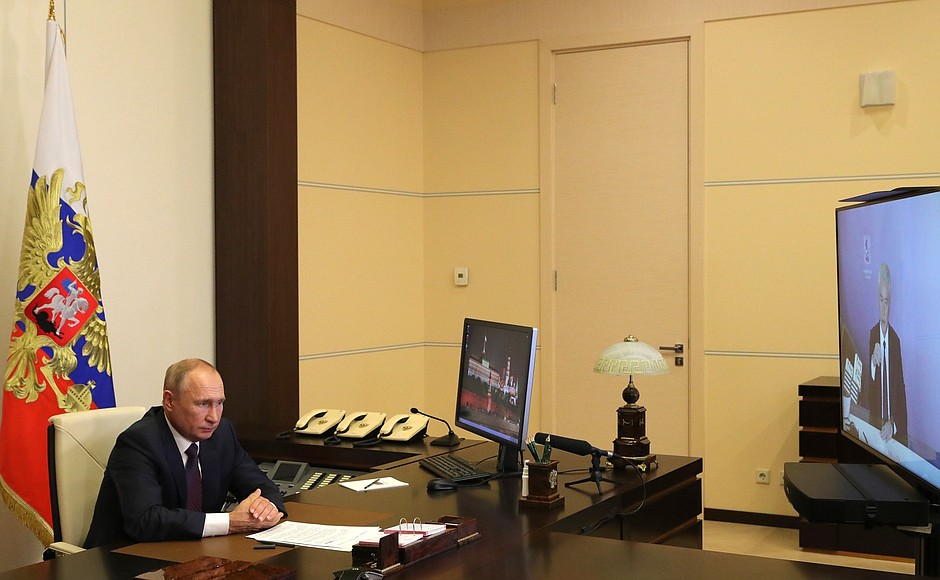
Sergei Sobyanin: Mr President, you remember the lowest point, when we were struggling the most, for example, when the sales for small and medium-sized businesses dropped almost by half of the average monthly turnover. Of course, we were not certain that the recovery would be fast. We predicted that it would happen in a year or a year and a half, and so on. But the measures taken by the Government pursuant to your instructions, plus our own package, or four packages of support measures for small and medium-sized businesses and the city’s economy – all these efforts helped SMEs to return to their pre-crisis sales, over the period between May and July. The current turnover is only six percent below its normal level.
In general, the retail and services have already bounced back to the pre-crisis level. Industrial production has returned to its pre-crisis level and the construction industry is close to its pre-crisis level. There has been a decline in completed residential housing projects but the investment and the industry itself are fully recovering. Of course, your decision to introduce mortgage concessions resulted in an explosive growth of investment in the industry.
Therefore, in general, I must say that the recovery is happening faster than we expected. However, of course, we must not downplay the huge number of problems in a whole range of companies because, for example, while the trade sector has fully recovered its volumes, there are still different companies involved in commerce. There are companies that sell remotely and small-scale wholesale companies; there are small shops which, of course, are still experiencing difficulties and their annual turnover remains low. But I think that after all, by the end of the year most of the problems in this area will be solved. Of course, the epidemiological situation in the country and in the city will be a major factor.
Vladimir Putin: You spoke about the construction industry. According to my information, the construction projects in Moscow suffered more than construction industry on the national scale. It is taking longer to complete the projects in development.
Sergei Sobyanin: That is true, Mr President. Finishing housing projects is indeed taking longer. Last year we set a new record. But right now, we are back to the level of 2017–2018. Due to changes in legislation, completion of many projects was expedited last year. However, the construction industry itself and the investment required for its full recovery are growing.
Moreover, the housing relocation programme and the law you signed on housing relocation in Moscow are starting to play a significant role in the industry. We are consistently moving forward with this programme. All the starting platforms are operating plus we created a solid foundation for urban development. We discussed the programme with Muscovites and clearly outlined the stages of major construction projects under the programme that will be increasing the scope of housing construction in the short term.
Vladimir Putin: Mr Sobyanin, we are all delighted when we see that new facilities, transport facilities, junctions, new metro stations are being put into operation in Moscow, and we are proud of our capital. Without any hesitation, I have to say, that it really does differ from many other megacities in the world, but of course in a good way. But all this is due to new projects, development projects and implementing development plans for Moscow.
What are the plans for the near future? In your opinion, what are the most promising and significant steps that should be taken to develop Moscow?
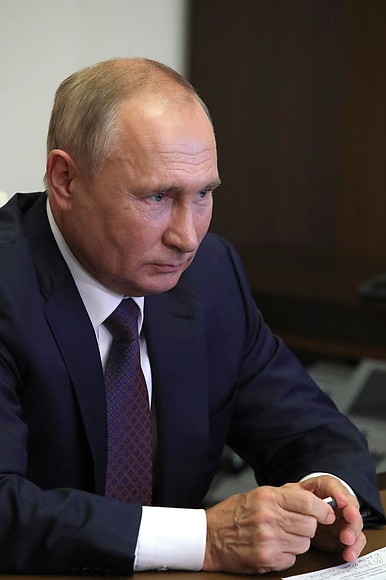
Sergei Sobyanin: Mr President, we have never stopped our strategic areas for the city’s development during the pandemic or especially now when we are getting out of it.
The first thing is to create a city that is people-friendly, for 12.5 million people in Moscow that are permanently living and working here. This involves ensuring a decent level of Moscow’s capital functions. And the third thing is, Moscow is one of the world’s largest economic agglomerations and, of course, directly influences the development of other regions, especially neighbouring ones, creating about 3.5 million jobs throughout the country. And all these areas should be comprehensively developed.
In 2018, you signed an executive order to establish the Moscow Innovation Cluster in Moscow and instructed the Russian Academy of Sciences, the Russian Government and us to work on this area. Today, 11,500 enterprises have already been registered there: these are institutes of the Academy of Sciences, research institutes, the largest innovative corporations that are engaged in innovative development, and their design bureaus. And two thirds are small innovative enterprises located in technoparks in Moscow and are simply engaged in innovations at their sites.
All this forms a fairly large innovation pool that can create new, world-class products, industrial designs and then produce them in cooperation with other regions, enterprises and organisations. We can see how this sphere has now crystallised and is beginning to move forward. This is certainly the great merit of Roscosmos, Rostec, Rosatom and a number of other organisations. Small innovative businesses are beginning to form a field around them that creates the stability of the structure.
Of course, we will continue to develop the transport infrastructure not only in Moscow but also the one connecting the neighbouring regions, including the Moscow Region. You and I opened the Moscow Central Diameters following your instruction, we are now working on the third and the fourth diameters, creating new main lines.
We decided to double the Moscow Metro. Today, 70 percent of this programme has already been adopted, we will continue to promote it, so that travelling within the city is comfortable and fast, otherwise the city will simply drown, given that the population is always growing.
Of course, we will not forget about the social programmes focusing on the development of healthcare and education. Especially because during the pandemic, many of them – for example, many clinics, served as the core clinics not only for the city but for other regions as well. Doctors would travel to other regions upon your instructions to provide methodological and material assistance to other regions in this complicated situation.
Mr President, I would like to thank you and the Government for supporting these programmes. It would not have been possible to fulfil them without your support. We are too closely connected and integrated with all federal programmes; therefore, obviously, a great deal depends on the decisions taken at the federal level. As for us, we are always ready to support you and be of service.
Vladimir Putin: Good.
And finally, the new academic year has started. How did Moscow approach September 1 and how did the new academic year in the city begin? I know that Moscow boasts a great number of new projects in education, innovative proposals and remarkable study programmes. The overwhelming majority of Moscow schools have wonderful teachers. How did the academic year begin?
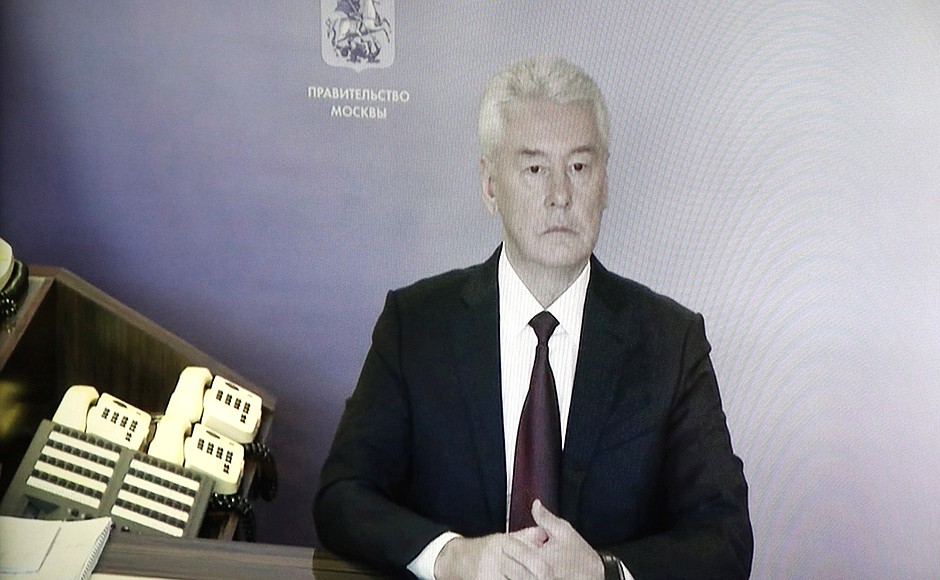
Sergei Sobyanin: I attended school opening ceremonies on September 1 and I had also met with teachers and parents before that. People were very concerned because it is not an ordinary year. They have not seen each other for six months and there are also certain risks related to the coronavirus.
We conducted a large-scale information campaign. Precautions are being taken to allow children to study in classrooms as usual. This work is finished; all the preschool facilities and schools are open and operating.
Of course, it was an ordeal for us. That period was not just a holiday or restricted school attendance. The work and the classes continued. And I must say that the Moscow education system passed the test. The results of the National Final School Exam demonstrate that we did not sacrifice our schoolchildren’s performance this year in the least bit. Of course, it is a big achievement of Moscow teachers and students.
Vladimir Putin: My best wishes to you and all the Moscow teachers working at universities and secondary and elementary schools.
I know how much your team is doing to respond to Muscovites’ needs and the social climate in order to improve the quality of life and make life in the capital better and better. The climate in the capital largely affects the climate in the entire country.
I sincerely wish you success and I hope that millions of Muscovites will feel the results of your efforts in their everyday life.
All the best to you and good luck.
Sergei Sobyanin: Thank you, Mr President. Thank you very much.
